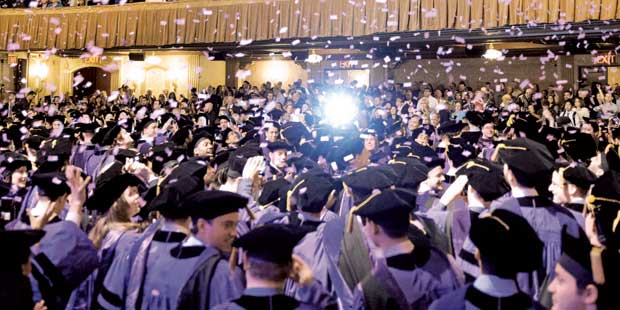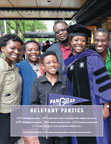In Praise of Platitudes
Printer Friendly VersionIn what may be a first, renowned litigator David Boies LLM ’67, chairman and founder of Boies, Schiller & Flexner, addressed NYU’s Class of 2013 at both the University’s 181st Commencement Exercises at Yankee Stadium on May 22 and the Law School’s Convocation on May 24 at the Beacon Theatre.
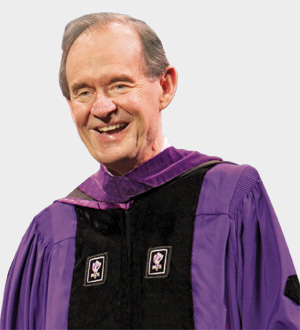 Boies was introduced at Commencement by Kenji Yoshino, Chief Justice Earl Warren Professor of Constitutional Law, and received an honorary Doctorate of Laws from NYU President John Sexton, who described Boies as “arguably the lawyer of the century.” Indeed, Boies’s case for the legality of same-sex marriage was also arguably the most widely watched of the Supreme Court’s term. And, at the time of the ceremonies, the decision had yet to be rendered.
Boies was introduced at Commencement by Kenji Yoshino, Chief Justice Earl Warren Professor of Constitutional Law, and received an honorary Doctorate of Laws from NYU President John Sexton, who described Boies as “arguably the lawyer of the century.” Indeed, Boies’s case for the legality of same-sex marriage was also arguably the most widely watched of the Supreme Court’s term. And, at the time of the ceremonies, the decision had yet to be rendered.
Boies, a Law School Trustee, remarked on the inevitability of clichés in commencement speeches: “We tend to talk on a day like this in platitudes. Change the world. Don’t be afraid to fail. The problem is that it’s too easy to dismiss platitudes.” But, with a nod to his historic Proposition 8 case, he quickly pointed out how important they nonetheless are: “One of the platitudes of our country is that all people are created equal. One is that every person has an inalienable right to life, liberty, and the pursuit of happiness. We are engaged today in a civil rights struggle to try to end the last official bastion of discrimination in this country.” Mentioning the violence and officially sanctioned discrimination that gays and lesbians have historically faced, Boies said, “We’ve come a long way since then, but we have a long way still to go.”
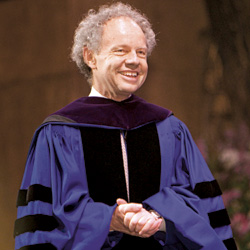 This year’s Convocation marked the last time that Dean Richard Revesz, who stepped down from his deanship on May 31, would preside over the festivities. He said he related to the feelings of all the newly minted graduates: “As my tenure ends I share with you that mixed sense of pride regarding what’s been accomplished, relief that it’s over, and more importantly, excitement for what is to come.”
This year’s Convocation marked the last time that Dean Richard Revesz, who stepped down from his deanship on May 31, would preside over the festivities. He said he related to the feelings of all the newly minted graduates: “As my tenure ends I share with you that mixed sense of pride regarding what’s been accomplished, relief that it’s over, and more importantly, excitement for what is to come.”
Speaking to an audience of lawyers, Boies cited personal contribution to the justice system as perhaps the most important criterion for professional success. “The law can be written down. It can be in books,” he said. “The law in the Soviet Union was just like our law. The law in Castro’s Cuba was just like our law. The difference was whether it was enforced by lawyers and by judges.”
Later in the afternoon, University Professor Joseph Weiler, Joseph Straus Professor of Law and European Union Jean Monnet Chaired Professor, praised the gathered LLM and JSD graduates, many of whom are not American, for their decision to combine legal educations from their home countries with US training, for what he called “the finest of legal educations.”
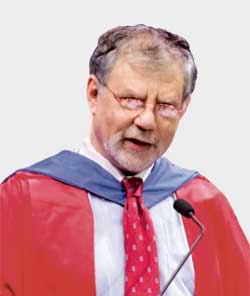 Weiler gave a close reading of a passage from Genesis 18, which he described as “one of the founding moments of the development of the notion of justice in Western civilization.” In the passage, Abraham asks God, who is about to destroy the cities of Sodom and Gomorrah, whether God would also destroy the righteous with the wicked. Parsing the passage, Weiler argued that since Abraham has not yet received divine instruction in the ways of justice, he is presumed to know it in his very constitution as a human being. “In real life…we typically know what is the right moral choice,” Weiler said. “The problem is not to know what I should do but to have the courage to do that which I know is the right thing to do.”
Weiler gave a close reading of a passage from Genesis 18, which he described as “one of the founding moments of the development of the notion of justice in Western civilization.” In the passage, Abraham asks God, who is about to destroy the cities of Sodom and Gomorrah, whether God would also destroy the righteous with the wicked. Parsing the passage, Weiler argued that since Abraham has not yet received divine instruction in the ways of justice, he is presumed to know it in his very constitution as a human being. “In real life…we typically know what is the right moral choice,” Weiler said. “The problem is not to know what I should do but to have the courage to do that which I know is the right thing to do.”
—
